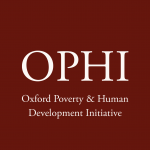Monday February 8th, 2021
10:00 AM-11:30AM EST
View Jakob Dirksen and Sabina Alkire’s slides here (PDF)
In order to break intergenerational cycles of poverty and sustainably alleviate deprivations, explicit focus on, and prioritisation of, disadvantaged children is imperative. This all the more so given that children are evidently both among the most vulnerable and oftentimes among the poorest members of societies around the world. In order to effectively focus policy efforts on the alleviation of children’s deprivations and to achieve sustainable poverty eradication, multidimensional measures that can accurately capture the many deprivations experienced by children are thus key. Recognising that child poverty is characterised by age-specific deprivations different from deprivations adults or children of other age groups experience, a rich and growing literature on child multidimensional poverty measurement has emerged. However, experience has shown that, for pro-poor(est) policy-making, such efforts have often resulted in disjoint measurement exercises producing separate statistics of child versus all-population multidimensional poverty. Such disjoint measures have been difficult to communicate and interpret alongside one another – causing confusion that can be disadvantageous in particular for those whose already disadvantaged circumstances they are meant to capture and help improve. Responding to this dilemma, in this presentation we offer four synergetic measurement strategies. These can be used to achieve clear, policy-prescriptive and actionable population-level statistics of multidimensional poverty that focus attention explicitly and directly on children’s deprivations, guiding the prioritisation of those least well-off and at risk of being left behind
About the Presenter:
 Jakob Dirksen is part of OPHI’s Research and Outreach teams. He is also a Lecturer at Leuphana University of Lüneburg, Germany. He has held research positions at the Blavatnik School of Government and Mansfield College at the University of Oxford, and has worked in diplomacy for the German Foreign Office. Jakob studied Liberal Arts and Sciences, Social Sciences, and Philosophy in Germany and Spain. His research interests are the theory and measurement of well-being, poverty and inequalities; sustainable development; and the capability approach.
Jakob Dirksen is part of OPHI’s Research and Outreach teams. He is also a Lecturer at Leuphana University of Lüneburg, Germany. He has held research positions at the Blavatnik School of Government and Mansfield College at the University of Oxford, and has worked in diplomacy for the German Foreign Office. Jakob studied Liberal Arts and Sciences, Social Sciences, and Philosophy in Germany and Spain. His research interests are the theory and measurement of well-being, poverty and inequalities; sustainable development; and the capability approach.
About the Discussants:
 Ana Vaz is the Director of Research and Technical Validation at SOPHIA Oxford, where she is developing tools for companies to measure multidimensional poverty among their employees and exploring how multidimensional poverty data might support social investment. Before joining SOPHIA Oxford, Ana was a Senior Research Officer at the Oxford Poverty and Human Development Initiative (OPHI), University of Oxford. Ana’s work at OPHI focused on the measurement of multidimensional poverty and women’s empowerment. She holds a DPhil in Economics from the University of Oxford, and she was previously on the faculty at the Catholic University of Portugal and a consultant at PricewaterhouseCoopers.
Ana Vaz is the Director of Research and Technical Validation at SOPHIA Oxford, where she is developing tools for companies to measure multidimensional poverty among their employees and exploring how multidimensional poverty data might support social investment. Before joining SOPHIA Oxford, Ana was a Senior Research Officer at the Oxford Poverty and Human Development Initiative (OPHI), University of Oxford. Ana’s work at OPHI focused on the measurement of multidimensional poverty and women’s empowerment. She holds a DPhil in Economics from the University of Oxford, and she was previously on the faculty at the Catholic University of Portugal and a consultant at PricewaterhouseCoopers.
About the Moderator:
 James E. Foster is the Oliver T. Carr, Jr. Professor of International Affairs, Professor of Economics, and Co-Director of the Institute for International Economic Policy at the George Washington University. He is also a Research Associate at the Oxford Poverty and Human Development Initiative at Oxford University. Professor Foster’s research focuses on welfare economics — using economic tools to evaluate and enhance the wellbeing of people. His work underlies many well-known social indices including the global Multidimensional Poverty Index (MPI) published annually by the UNDP in the Human Development Report, dozens of national MPIs used to guide domestic policy against poverty, the Women’s Empowerment in Agriculture Index (WEAI) at USAID, the Gross National Happiness Index of Bhutan, the Better Jobs Index of the InterAmerican Development Bank, and the Statistical Performance Index of the World Bank. Prof. Foster received his PhD in Economics from Cornell University and has a Doctorate Honoris Causa from Universidad Autonoma del Estado Hidalgo (Mexico).
James E. Foster is the Oliver T. Carr, Jr. Professor of International Affairs, Professor of Economics, and Co-Director of the Institute for International Economic Policy at the George Washington University. He is also a Research Associate at the Oxford Poverty and Human Development Initiative at Oxford University. Professor Foster’s research focuses on welfare economics — using economic tools to evaluate and enhance the wellbeing of people. His work underlies many well-known social indices including the global Multidimensional Poverty Index (MPI) published annually by the UNDP in the Human Development Report, dozens of national MPIs used to guide domestic policy against poverty, the Women’s Empowerment in Agriculture Index (WEAI) at USAID, the Gross National Happiness Index of Bhutan, the Better Jobs Index of the InterAmerican Development Bank, and the Statistical Performance Index of the World Bank. Prof. Foster received his PhD in Economics from Cornell University and has a Doctorate Honoris Causa from Universidad Autonoma del Estado Hidalgo (Mexico).

